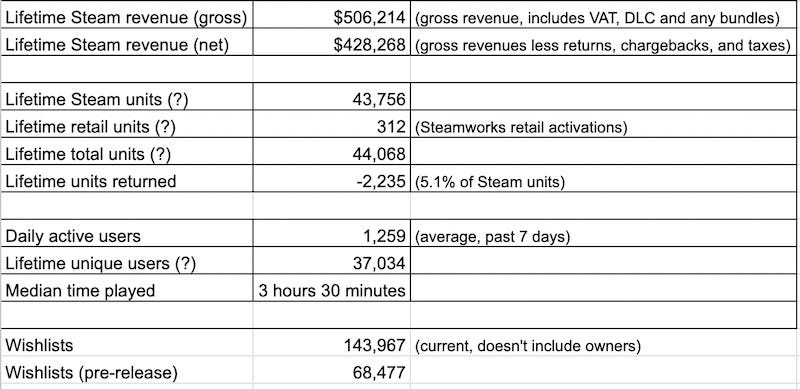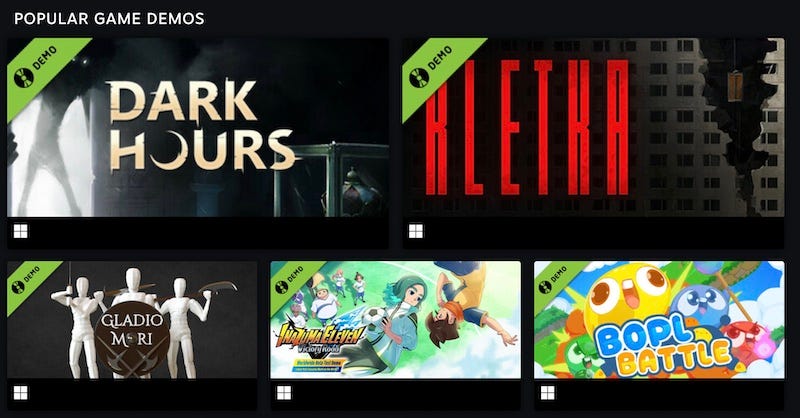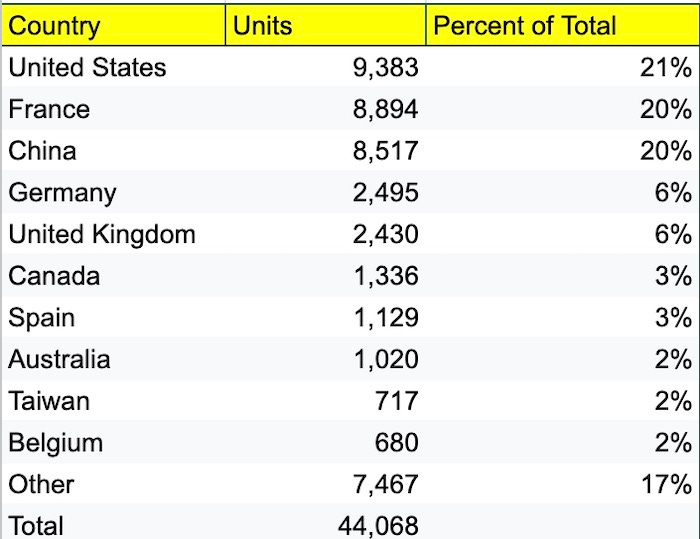How this tiny-dev narrative game sold almost 50k in a month
Publikováno: 19.8.2024
Also: why demos work, with a brief 'but maybe?' And lots of news.
[The GameDiscoverCo game discovery newsletter is written by ‘how people find your game’ expert & company founder Simon Carless, and is a regular look at how people discover and buy video games in the 2020s.]
Hey, all! GDCo is on the road this week, with an in-person company confab in Prague, ahead of one or two of us visiting Gamescom later this week. But dubious hotel Internet won’t stop us from bringing you the newsletters, oh no. Let’s do it…
Before we start, ever wonder what Minecraft’s Ender Dragon smells like? Cosmetics firm Lush can tell you, thanks to a licensed cosmetics line that also features a TNT bath bomb which is “an absolute explosion of ylang ylang and jasmine.” We love this tie-in.
[PLZ NOTE: you can support GameDiscoverCo by subscribing to GDCo Plus now. You get access to both of our weekly newsletters, our friendly Discord server, a super-detailed Steam data suite for unreleased & released games, eight game discovery eBooks & lots more.]
How did The Operator sell nearly 50k in Month 1?
When we do ‘hey, you missed this game and it’s doing well!’ profiles at GDCo, we have a couple of different scales of success. If you’re a larger, better-funded dev, you are probably looking to sell hundreds of thousands of units before you get excited.
But any tiny or solo dev who can sell tens of thousands of copies in a few weeks - as parkour game Rooftops & Alleys and ‘90s horror re-imagining Crow Country did - is really doing amazing in today’s crowded market. (There aren’t many of these games.)
And look, we’ve found a new one for you - Bureau 81’s The Operator ($14), a game where you work as an ‘operator’ for the FBI-like ‘FDI’, and use a ‘fake OS’ for “fact-checking, searching databases, identifying killers, and more.”
It debuted on July 22nd on Steam. And here are the game’s surprisingly good - to us - Steam results, after less than a month:

This is an extremely creditable start - and the game was the #4 most-reviewed new title on Steam in the week it came out(GDCo Plus-exclusive data!) Over time, we’d imagine it will gross 3 or 4 times the above $ figure. But why? Let’s see:
Big streamers really love this game’s sinister ‘feel’: conspiracies are huge in culture today, and The Operator’s creator Bastien Giafferi told us: “The X-Files Game had a big impact* [on me], and I don't think we’ve had many games with a similar vibe.” The result? Streamers like xQc (EN) and Bob Lennon (FR), as well as Insym(EN, above) organically jumped on board to investigate the mystery.
‘Fake OS’ games may be an underdeveloped genre: the idea of using a computer operating system for interactive fiction was part of hits like Orwell and Hypnospace Outlaw. Why? There’s something immersive about logging in and assuming the identity of ‘not yourself’ to solve mysteries.
The game’s quality overwhelmed concerns over length & linearity: if you look at the 93% Positive Steam reviews for The Operator, you’ll see multiple players say ‘this was more linear than I thought, but it was so good that I didn’t care’. (Yes, Your Grace is another hit with similar comments.) The game is also ‘only’ 3-4 hours long, but again, people don’t seem to mind since it’s so good.
It’s also worth showing The Operator’s breakdown of sales per country, which is a bit different to other similar titles:
What jumps out there is France being 20% of the sales - that’s over 7.5x the median. But the dev is from France, tells us he promoted the game a lot locally, and the French translation at launch attracted big local streamers. So it makes sense!
We were also impressed the game was localized into English, French, Italian, German, Spanish, and Simplified & Traditional Chinese on launch day, given the game is only made by one (and more recently two) people. So we asked Bastien about that.
He said that the game has roughly 30,000 words in it, and: “Each language costs between 3.5k euros and 5k euros for the most expensive languages. It was expensive, but since it's a text-heavy game that requires the player to understand the story to progress, it was very important to localize to as many languages as possible.
We started with the Chinese (Simplified and Traditional) with our partner Indienova. Thanks to them I was able to make sure the UI would work with other languages, and that was a huge help. When we finished writing the story, we started localizing all the other languages with our localization agency (Loc-3).”
We think this really helped sales. And 30,000 words, while big, was maybe smaller than we thought. (When we covered hit visual novel Slay The Princess, we noted that not localizing lost them sales - but that game has a whopping 150k words!)
Concluding: The Operator is a great game. But a lot of games are great in today’s market and don’t sell. What the title did differently was its FBI/conspiracy hook & the ‘fake OS’ storytelling angle. (It also has good voice acting, rare for lower-budget titles, which helped deepen immersion.)
The combination of the above attracted streamers, players discovered the game and spread ‘word of mouth’ from there, and… hey presto, it’s a discovery win. Predictable? No. But understandable, now we’ve analyzed it? ‘The truth is out there’, we hear.
[*Bonus content: while Bastien’s key inspiration was 1998’s The X-Files Game, he also cited Her Story and Return of the Obra Dinn, adding: “I really tried to have the same ‘here's all the pieces of evidence, now make your own deductions’ mechanic as Return of the Obra Dinn.”]
Demos are great - but are they great all the time?

Recent years have definitely ushered in the return of the game demo, after a period of retail-first ‘buy it to try it!’ ethos - which encouraged people to wait to play the game, rather than check it a demo early. That wasn’t universal, but it was more of the norm.
The key reasons that we think demos are back, baby, as we were discussing with a client recently? As PC Gamer recently said - ‘demos are the meta now’. It’s because they have a different goal:
Demos have become a source of publicity, rather than a 'try before you buy' tool: modern demos are much more about attracting new eyeballs to your game, rather than allowing people who were already enthusiastic about the game to try it. (Although both can still be true, and playtest feedback is vital to honing games.)
Some opportunities to expand your discovery via demos are bigger than others: in particular, pre-release showcases like Steam Next Fest (massive, but crowded) and tighter themed Steam sales events (way more niche, but demo highlighting less natural) are times when having a demo will boost discoverability.
Discovery effects can be both algorithmic & external to the platform: getting a page’s interest boosted during Next Fest can lead to a) extra featuring on the Next Fest page, b) deeper algorithmic boosts like Steam’s Discovery Queue c) influencers taking notice and picking up your game to play on YouTube or Twitch.
So should you launch a pre-release demo for your game timed to a major Steam promotion? Yes, we all chant. But how about having a demo for your game up all the time, both pre and post-release? That’s a good idea, right?
This is where popular wisdom varies. A lot of experts I know are fans of this approach, including Chris Zukowski, who points out that if a streamer decides to cover you in an ‘off time’, you want to have a demo easily available for them.
But I know some other smart data-savvy people - including Excalibur’s Steve Stopps suggesting that ‘all demo, all the time’ might not be good. So we talked to Ranch Sim’s publisher about why the hit game had a limited one-off pre-release demo:
Being front and center in Next Fest? It’s (likely!) a winner - Stopps notes: “If you get good featuring in an event like NextFest, then you’ll gain a lot of traffic as a direct result of your demo. If you increase page visits by 500%, but your demo hurts conversion by 20% - then the benefit outweighs the cost.” You can be empirical about this.
But should you make players pick between game & demo? He says there’s a concern, esp. post-release, that: “some of the people who would have paid for your game there and then will instead download the demo.” Then some of those ‘demo first’ crew won’t buy, “either because they don’t like the demo, don’t play the demo, or… because the moment has passed.”
You should look at ‘real’ data on a daily basis to work this out: “Developers should have intimate knowledge of their [Steam] page traffic, and know the difference with and without a demo, to understand how much traffic it is gaining them.” Stopps says - look carefully in quiet times, and nix the demo if it’s no longer helping visibility or conversion.
He also thinks that “losing sales while you wait for a big streamer to play your game” isn’t a good strategy. (On the other hand, if a streamer plays your game, but other streamers don’t have access to the demo, is that stopping ‘streamer to streamer’ virality?)
The general conclusion: unclear. GDCo is likely against post-release demos, and on the fence about ‘pre-release demo available all the time’. Would be great to have more A/B test data on real games in ‘quiet times’ to see how traffic and wishlists/buying changes, both with or without demos available. Hit us up if you have that data!
The game platform & discovery news round-up…
Finishing things up for today, let’s take a detailed look at a whole bunch of game discovery news that hit the Interwebs, since we were last in your inboxen:
Lots of Epic-related news: the Epic Games Store is live on Android (worldwide) and iOS (in Europe only), with Fortnite, Fall Guys, and Rocket League Sideswipe. Epic’s doing much complaining over the convolutedinstall process(above), and the company’s Steve Allison said that third-party games should arrive in Q4.
A big ‘streaming online’ discovery focus of this week at Gamescom is Tuesday’s Opening Night Live showcase, and Geoff Keighley is trailing some of the notable featured games, including Indiana Jones, VR title Batman: Arkham Shadow, and a new Tarsier Studios game.
Wolfire’s U.S. antitrust lawsuit over Steam and price-fixing, which we’ve covered in a lot of detail, has a little brother now, as four Steam players “mounted a sustained and ultimately successful challenge to the enforceability of Valve’s arbitration provision” - so they’re hopping on the legal train, too, using Wolfire’s arguments.
There’s mucho rumors over Taiwan-based Weltrend Semiconductor saying orders of its chipsets “will recover in [Sep-Nov. 2024], including initial shipments of the new PlayStation 5, Xbox and Nintendo Switch models.” So that’s PS5 ‘Pro’,Xbox’s slight SKU refreshes maybe, and presumably ‘Switch 2’. But even if manufacturing starts soon - no Switch 2 until 2025, folks.
Epic’s Tim Sweeney was typically uncensored in a press call with journos, talking about the $1 billion they’ve spent (or lost) pursuing open, lower-fee app stores, and saying of Epic Games Store on PC: “We spent a lot of money on exclusives… a few of them worked extremely well. A lot of them were not good investments, but the free games program has been just magical" for new user acquisition.
There’s an excellent new piece about ‘perennial sellers on Steam’ from Ryan Rigney, who identifies titles like Deep Rock Galactic, Raft, and (of course!) Stardew Valley as games that just keep selling, month after month, due to overall quality, “an experience you can’t get anywhere else”, and “a reputation as the best in [their] category.”
Of course, enforcement of this is a nightmare, but the U.S. FTC announced a new rule on ‘fake reviews and testimonials’ which actually ties up with some Steam rules, conceptually - it “prohibits businesses from providing compensation or other incentives conditioned on the writing of consumer reviews expressing a particular sentiment.”
Roblox is taking a page from Google Ads, per David Taylor: “Roblox experience owners can now submit bids for specific [paid] key word searches and Roblox will display those experiences at the top of the search results.” Taylor thinks that “anywhere from 10%-30% [of incoming traffic to Roblox games] comes from 'Search'.”
The folks at Pantaloon (who are also doing an interesting indie game giveaway newsletter) are launching a (free reg. required)game publishing hub, including a pitch deck template, a brand plan template, and a number of other resources.
Microlinks: game sales in Europe in July 2024 were up slightly, although console sales were down 46%, youch; PlayStation Plus Game Catalog for August adds The Witcher 3: Wild Hunt, Wild Hearts, Cult of the Lamb and more; a survey of mobile game devs is mixed on whether publishers help - 34% pro, 27% anti.
Finally, Alice Taylor from Walt Disney Studios’ Studiolab has been LinkedIn-ing about a pretty cool piece of game-adjacent tech shown at Disney’s D23 event this year: “been wanting to do this since the early days of machinima: full size, photoreal, live-performable ... Rocket Raccoon!”
As Taylor explains: “It's Unreal Engine, pushed to its beautiful and current limit by the absolute magicians at ILM Immersive… It's a live performance.. fully markerless mocap, retargeted to Rocket's 2' 11" of height.” (Things have come a long way, tech-wise, since Charles Martinet did similarly with Mario at CES 1992, huh?)
[We’re GameDiscoverCo, an agency based around one simple issue: how do players find, buy and enjoy your PC or console game? We run the newsletter you’re reading, and provide consulting services for publishers, funds, and other smart game industry folks.]
